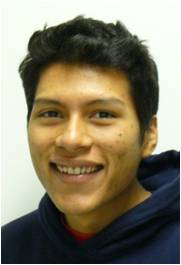Luis Gomez receives 2009 NSF Graduate Research Fellowship to investigate a new treatment for neurological disorders
Gomez is investigating a new technique that is receiving widespread attention for treating depression, Alzheimer’s, and other brain conditions.

 Enlarge
Enlarge
Luis Gomez, graduate student in electrical engineering, is the recipient of a prestigious NSF Graduate Research Fellowship to support his research related to treating neurological disorders.
Mr. Gomez is currently investigating a new technique that is receiving widespread attention across the medical field for treating depression, Alzheimer’s, and other brain conditions called Transcranial Magnetic Stimulation, or simply TMS. The goal of TMS is to stimulate the neurons in the brain, which in turn may cause improvement in a variety of neurological conditions. More specifically, one or more current-carrying coils located near the scalp pump magnetic fields into the brain; these fields then excite neuronal tissue. TMS relies on the ability to spatially control field distributions inside the brain. However, optimal TMS systems for focusing fields inside the brain have not been developed.
Luis describes the current goal of his research as follows: to (i) develop CPU and memory efficient integral equation (IE) computational electromagnetic (CEM) solvers for analyzing complex TMS systems and (ii) to then use these solvers to study new TMS systems capable of producing highly localized brain excitations. The new TMS systems will leverage new coil designs and magnetostatic metamaterials lenses.
Luis Gomez is pursuing this project in collaboration with Prof. Eric Michielssen and Prof. Tony Grbic in the EECS Department, and with Prof. Luis Hernandez in Bioengineering.
The Graduate Research Fellowship provides three years of support for graduate study leading to research-based master’s or doctoral degrees in the fields of science, technology, engineering, and mathematics (STEM), and is intended for students who are in the early stages of their graduate study.
 MENU
MENU